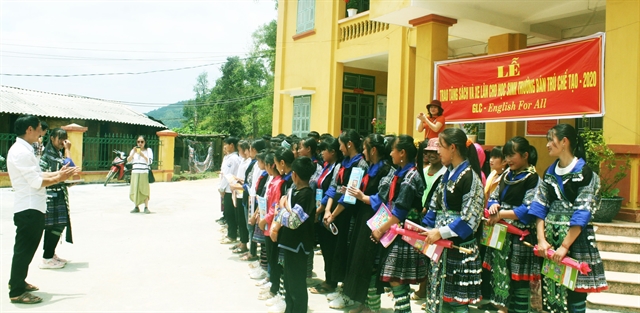 Society
Society

Located hundreds of kilometres from the province’s centre, Chế Tạo is the poorest commune of Mù Căng Chải District, the northern mountainous province of Yên Bái. The local community might be underdeveloped but the children are not uneducated thanks to the efforts of authorities.

|
| Students of Chế Tạo day boarding ethnic primary and secondary school receive presents from donors. — VNA/VNS Photo |
YÊN BÁI — Located hundreds of kilometres from the province’s centre, Chế Tạo is the poorest commune of Mù Căng Chải District, the northern mountainous province of Yên Bái. The local community might be underdeveloped but the children are not uneducated thanks to the efforts of authorities.
Teacher Phạm Tiến Quảng, principal of Chế Tạo day-boarding ethnic primary and secondary school, said up to 95 per cent of children go to school at the right age with an equal percentage of boys and girls among students.
Getting girls educated helps tackle the ideology of ‘girls do not need to go to school’ among the local Mông ethnic group.
Quảng and many other teachers at the school volunteered to move from downtown areas to Mù Căng Chải to teach children and they think they will spend the rest of their lives there.
Chế Tạo day-boarding ethnic primary and secondary school has 26 teachers, teaching 487 students from the Mông ethnic group.
The students have made improvements and learn quite quickly. They are better at maths than Vietnamese. About 12 per cent of students have performed excellently, Quảng said.
However, sometimes, some students leave school to get married at an early age. Male students return to school after marriage but married female students no longer come back.
The good news is that more parents have encouraged their children to go to school, Quảng told Vietnam News Agency.
The biggest difficulty for teachers is to encourage students to go to class at the beginning of a new school year after the summer break. Teachers have to go to each house to persuade children and their parents.
“If teachers were not courageous and had not nurtured the love for their job, they would have left, especially new graduates,” Quảng said.
While school was closed at the peak of the COVID-19 pandemic, online teaching was not available due to weak internet connections, so teachers had to visit houses to tutor students.
After social distancing, encouraging students to return to class was another tough task because many children were working in the fields or had moved to other provinces to work with their parents.
The State has covered tuition fees and given 15kg of rice per month to each student to encourage more of them to attend class.
As well as the State and local authorities, many private donors have taken action to fund education.
Thanks to State investment in a 35km road connecting the commune’s centre with the district’s centre, more and more donors can reach the area.
The Global Languages Centre (GLC)’s fund, initiated by a Vietnamese-Australian, donates books, clothes and food twice every year to children at Chế Tạo Commune’s school.
Phạm Thủy, GLC founder and general director, is calling for assistance from foreigners to make donations in a more sustainable way.
She has connected with Marcus Bessel, a German working in Việt Nam and Jörg Neddermann, an executive director of a German company, to provide capital and technology to treat waste at the school’s day-boarding area. The project was put into operation in early 2020.
The GLC fund and the two German men plan to build a water tank which supplies water for 500 students and teachers in the dry season. The second day-boarding area for primary students including five rooms which covers 170sq.m will soon be completed thanks to the donors. — VNS




